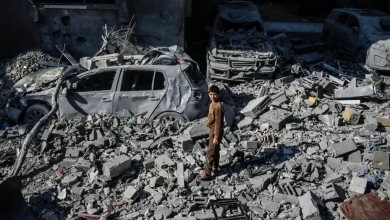Police in southern Pakistan have shot dead Dr. Shahnawaz Kanbhar, a doctor accused of blasphemy, prompting condemnation from human rights groups. According to local police chief Niaz Khoso, the shooting occurred during a confrontation with officers who were unaware of Kanbhar’s identity. The doctor had gone into hiding after being accused of insulting the Prophet Muhammad and sharing blasphemous content online. This incident marks the second blasphemy suspect to be killed by police in Pakistan within a week.
According to a police report, officers in Mirpur Khas attempted to stop two men on a motorcycle for a search on Wednesday. Instead of complying, one of the men opened fire, leading to a gun battle in which Dr. Shahnawaz Kanbhar was killed. Local police chief Niaz Khoso stated that it was only after the shootout that officers realized they had shot Dr. Kanbhar. The second person on the motorcycle managed to escape.
Another police official, Khas Asad Chaudhry, claimed that Dr. Kanbhar was accidentally shot by his companion during the incident. However, a relative of Dr. Kanbhar alleged to BBC Urdu that he was killed in a “fake encounter,” a claim that local police deny. In response to the incident, Zia-ul-Hasan Linjar, the Interior Minister for Sindh province, has ordered an independent inquiry into Dr. Kanbhar’s death.
This incident follows a similar event a week prior, when a police officer opened fire inside a station in Quetta, fatally injuring another suspect accused of blasphemy. The series of deaths has drawn significant criticism from the Human Rights Commission of Pakistan (HRCP), which expressed grave concern over what it described as the alleged extrajudicial killings of two individuals accused of blasphemy.
In a statement released on Friday, the HRCP highlighted the troubling trend of violence in blasphemy cases, particularly when law enforcement is allegedly involved. The organization called for urgent action to address these issues, emphasizing the need for accountability and protection of human rights.
Dr. Shahnawaz Kanbhar was shot dead a day after Islamist protesters in nearby Umerkot demanded his arrest and set fire to his clinic. His relatives reported to BBC Urdu that they faced significant obstacles traveling for miles to bury his body, as local residents and officials blocked their way.
This incident in Sindh province follows a week after a police officer opened fire inside a police station in Quetta, fatally wounding another suspect accused of blasphemy. The man had been arrested after police rescued him from a furious mob claiming he had insulted the Prophet Muhammad. Despite the accusations, the man’s family and tribe reportedly forgave the officer, acknowledging that he had indeed offended Muslim sentiments.
While mob killings of blasphemy suspects are common in Pakistan, police-involved killings are relatively rare. Accusations or even rumors of blasphemy can quickly lead to violent riots and mob action, escalating to deadly outcomes.
Under Pakistan’s stringent blasphemy laws, anyone found guilty of insulting Islam or its figures can face the death penalty, although authorities have not executed anyone for blasphemy to date. In recent years, there has been a noticeable increase in attacks against individuals accused of blasphemy. For example, in June, a mob stormed a police station in Madyan, abducting and killing a detainee accused of desecrating the Quran.
